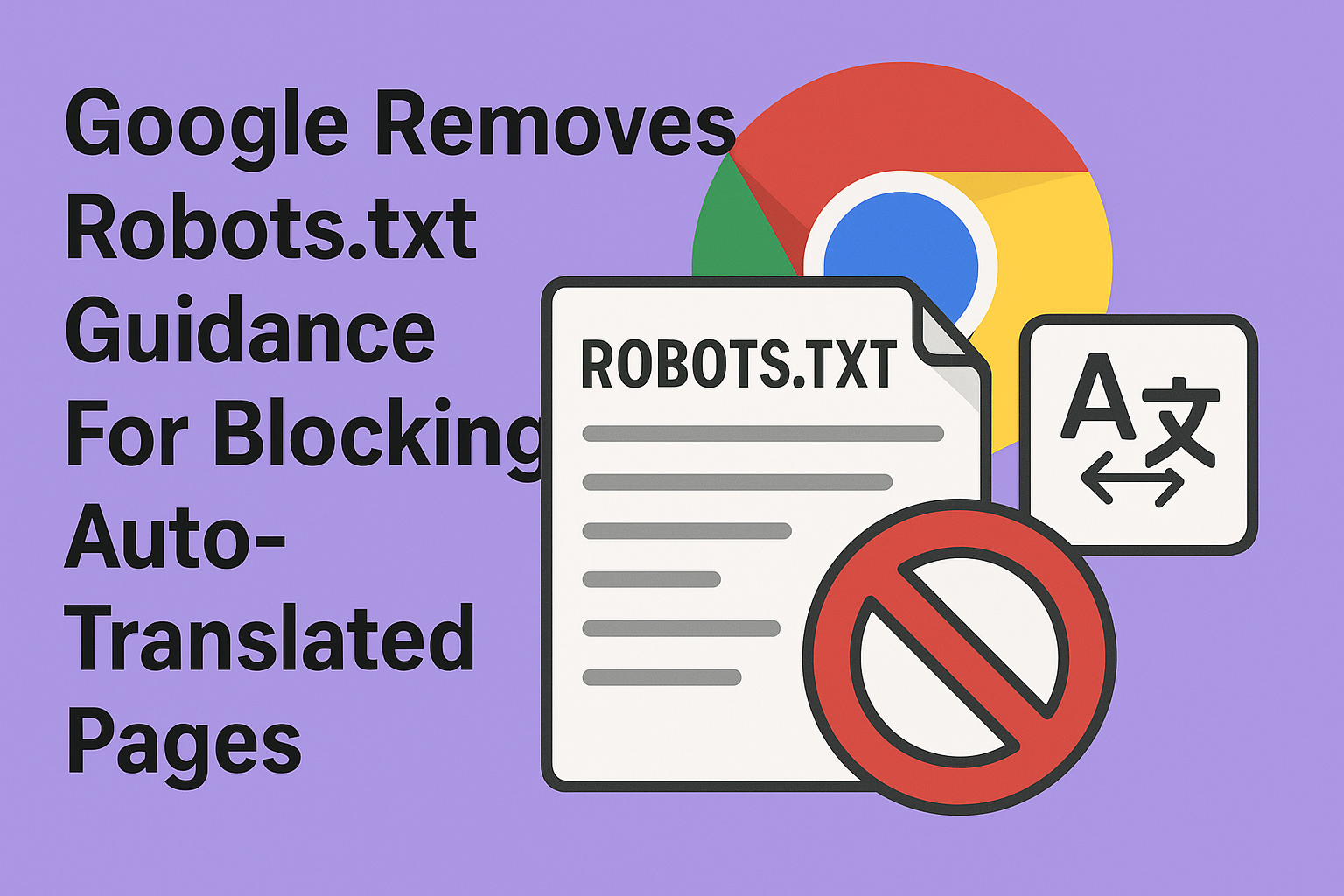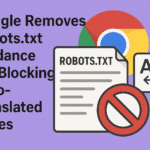
Google modifies its instructions: The company has removed old guidance that told site owners to block automatically translated pages in their robots.txt.
Focus on Content Value: This change updates Google’s documentation to be aligned with new spam policies, which now assess content based on user value—not how it was created.
More nuanced auto-translation management: Rather than behaving as though all machine-translated pages should automatically be blocked, Google now suggests using page-level controls (like meta noindex tags) for low-quality translations, while letting valuable translations be indexed.
Google is “erasing” its old SEO guidance, as its position on automatically translatable content has changed. In fact, the search engine giant updated its documentation on June 11, 2025, without fanfare, and eliminated one portion of text that was recommending that all machine-translated pages be blocked in robots.txt. This change reflects Google’s evolving stance on content: content is now evaluated based on how the content provides value and quality to the user, regardless if that content written by a human or generated by an algorithm. Importantly, Google did indicate that this was simply documentation clarification and that there was not some change in indexing behavior or search.
Table of Contents
Why This Matters
On the surface, deleting a few lines within Google’s help documentation seems trivial, but really a significant shift in philosophy has taken place. Google deleted the old guidance, so that it did not become irrelevant after at least one of last year’s bundles of “scaled content abuse” policies introduced last year. The introduction of these spam policies (released in early 2024) determine if content is useful to a user, and while content is important, without regard to how it was created, useful content is what is relevant.
Old Guidance: In the past, Google’s documentation implied that auto-translated content was suspect. Past advice indicated that site owners would be wise to block the robots.txt file against automatically translated pages to not let those pages be indexed at all.
Implied was the obvious fact, that so many machine translations could be spammy to a low-quality degree, so a “block by default”, was a reasonable position.
New Guidance: Today, Google’s position on auto-translated content is both objective and nuanced. Rather than indicating no indexing of translated content, webmasters are encouraged to assess the quality of the translation depending on case-by-case basis, again, focusing on a user’s value created out of the content rather than what form it may have been created.
The new approach: High-quality translated pages, and which fulfills a user need, can be indexed and shown in search. On the other hand, if the quality of a translated page is poor or „nonsensical”, then it should be handled accordingly (adding a noindex meta tag for example) rather than simply disallowing the auto-translated page in general.
Google has never implied that machine translations are spam my nature, and the old guidelines implied this in an indirect fashion. However, this deleted recommendation around robots.txt documents, implies as Google is opened to let contents produce by algorithm, as long as the content produced abstracts user value intention, this reason that would result in Google not to be concerned about quality of content as parallel to how it is produced.
What to Do Now
According to Google, the change in their documentation does not expect webmasters to change their websites overnight.
It is, however, a good reminder to reconsider how you handle translated content on your website, so here a few specifics for site owners and SEOs to consider:
Review your robots.txt: Review your robots.txt file for rules that blanket block translated pages. If you see rules blocking certain language pages or pages generated from auto-translation, start with taking a fresh look at the necessity. If your translations are decent in quality and provide real user value, you may want to remove these disallow rules and allow these pages to be crawled by Google.
Establish quality measures for translation: Not all automated translations carry the same quality. Review your otherwise translated pages and evaluate quality. Keep pages that read well and convey meaning properly to the original source. Consider adding a noindex to horrible/ confusing translated pages so they are not indexed at all. Bottom line, keep the good and consider noindexing the bad.
Think user-first: Always be thinking whether a translated page is honestly helpful to users in that language. Are you providing value to those users, or simply hoping to strap on some additional keyword value? If a page exists only to help pad your website with additional languages and truly does not provide utility or readability, then do not index it. You are ultimately tackling user experience, and you will automatically be doing what Google advises.
Use specific page controls instead of site-wide bans: Be selective and start to turn the corner. Instead blocking all auto-generated content on your entire site, apply page-level controls like noindex in the meta or canonical tags to specific pages that were auto-generated. This way you are not eliminating an entire language section only because some pages might be poorly constructed. It is a better approach and affords you control at the page level, which is in line with what Google is advising in their updated guidance.
The Takeaway
Although Google’s retraction of the robots.txt block recommendation may feel like an innocuous housekeeping change, it nevertheless highlights the evolutionary nature of the search landscape. Google is sending a good signal – automated content is not necessarily “evil,” it’s all about quality and utility. The takeaway for SEO professionals and site owners is to be flexible and always keep user experience top of mind. As Google’s policies change to reflect value in content (in whatever way it is produced), make sure your translated pages are useful and of high quality to stay in Google’s good favor and continue to reach a worldwide audience.




